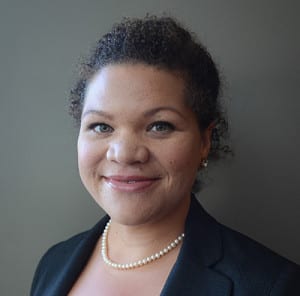
By Andrew Cohen
In law and in life, Savala Trepczynski ’11 is a big believer in due diligence. But after trying to find a downside to leading Berkeley Law’s Thelton E. Henderson Center for Social Justice, she happily came up empty.
“Berkeley is a high-octane engine, and who doesn’t want to drive a Ferrari?” said Trepczysnki, who will become the center’s executive director in January. “This opportunity was irresistible.”
Established in 1999, the Henderson Center is the hub of Berkeley Law’s vibrant social justice community. It prepares budding lawyers to represent the underserved and promotes collaborative efforts among academics, practitioners, policymakers, organizations, and community groups.
For the past two years, Trepczynski has served as associate director of the Damon J. Keith Center for Civil Rights at Wayne State University Law School in Detroit. In that role, she helped secure significant funding to pursue racial equity work; published two volumes of the school’s Journal of Law in Society; and organized extensive social justice programming for students, scholars, and community members. Her writings on race, government, and social policy have appeared in the Detroit Free Press and the San Francisco Chronicle.
As a law student, she worked at the U.S. Attorney’s Office in the Northern District of California and at the Office of White House Counsel in Washington, D.C. After graduating, she clerked for Judge Damon J. Keith on the U.S. Court of Appeals for the Sixth Circuit and then practiced at Keker & Van Nest in San Francisco. There, she focused on civil rights law and complex civil litigation, advising clients on the legal aspects of policy, ethics, and constitutional law.
“Savala stood out from a pool of exceptionally well-qualified candidates for her talent, experience, and deep commitment to social justice,” noted Clinical Professor Jeffrey Selbin, one of the center’s co-faculty directors with Professor Bertrall Ross.
Driven to make a difference
Trepczynski graduated magna cum laude from New York University and worked for five years before starting law school. At Berkeley Law she served as editor-in-chief of the Berkeley Journal of African-American Law and Policy and gained social justice legal training at the East Bay Community Law Center. An award-winning member of the Board of Advocates, Trepczynski was also a student representative on the school’s Admissions Committee.
“I loved law school, and I’m not sure I would’ve loved it if I hadn’t gone to Berkeley,” she said. “There were so many wonderful moments, friendships, and opportunities for mentorship. As a professional, you can’t beat the school’s intellectual environment. It’s an incredibly exciting and solution-oriented place in a way that isn’t dependent on the past. I’m thrilled to return.”
Trepczynski is also eager to help the Henderson Center train Berkeley Law students in social justice advocacy and scholarship, be responsive to the needs of disadvantaged communities, and generate high-yield projects with partners on and off campus.
Center staff and students have been active on working-group subcommittees—which the school launched in February—to identify initiatives to explore criminal, social, and racial justice issues that arose from the deaths of unarmed African Americans killed by white police officers. Last summer, the center provided travel and registration funding for 11 students who attended the Law4BlackLives Conference in New York City.
“Many social justice issues are coming to a boil around the world and right here in the Bay Area,” Trepczynski said. “The center’s relationship with students has to be dynamic and can’t operate without regard for what’s happening on the ground. We’ll explore the best ways to maximize our impact and then present stakeholders—from community members to students to law school leadership—with models for how we can move forward.”
Trepczynski emphasized that the center welcomes students with myriad career plans—not just those pursuing public interest law. “There are enough needs in this world to go around,” she said. “We’ll have a seat at the table for every student with an inclination that social justice matters to some part of their life.”